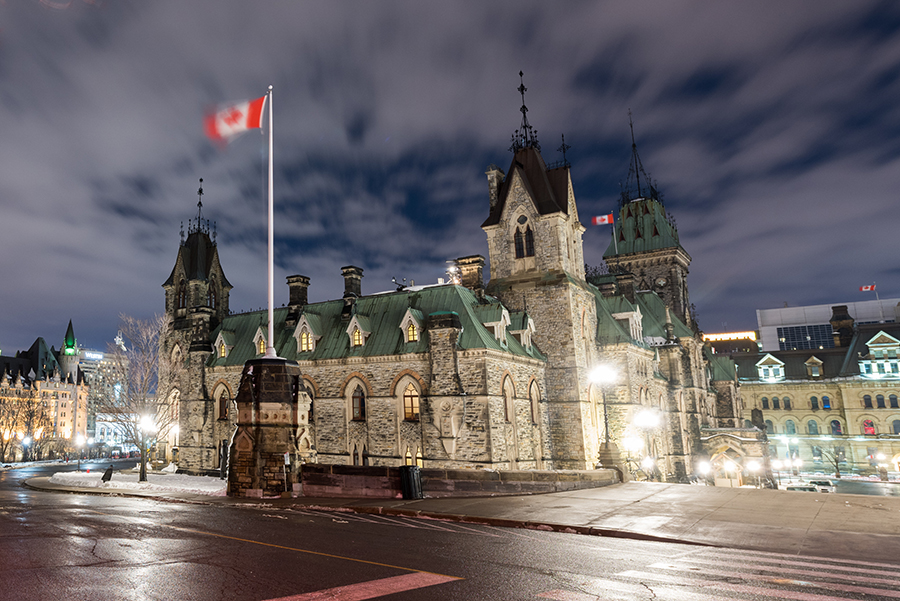Tired slogans in face of Trump tariffs spell real risk for Poilievre

John Woodside,
Local Journalism Initiative Reporter
As incoming U.S. President Donald Trump threatens a trade war to push Canadian officials to cave on a list of demands, Conservative Leader Pierre Poilievre is in a political bind that represents his first real threat to his electoral chances, experts say.
Poilievre is still riding high in the polls, and his party is widely expected to form the next government, but nonetheless political scientists interviewed by Canada’s National Observer say Poilievre’s problems are piling up around him, without a clear way out, due to conservative premiers in Alberta and Ontario in open opposition to each other. For Poilievre, taking a side in the dispute risks upsetting voters he is counting on in those provinces.
The conflict between premiers Danielle Smith and Doug Ford, representing two of the country’s largest economic engines, is over how best to proceed against American tariff threats. Last week, Smith refused to sign onto a joint statement endorsed by Ontario, and every other province and territory and the federal government, agreeing on next steps if Trump imposes 25 per cent tariffs on Canadian exports. The reason, she said, was because federal officials won’t rule out cutting oil exports to the United States as leverage.
Ford said he understands the impulse to defend one’s jurisdiction, but country comes first.
“You can’t let someone hit you over the head with a sledgehammer without hitting them back twice as hard, in my opinion,” Ford said before the premiers’ meeting. “If you have some aces, you hold on to your aces.”
Poilievre has yet to take a clear position, and opponents are noticing. Prime Minister Justin Trudeau called on Poilievre last week to fight for Canadians or “stand with Danielle Smith, Kevin O’Leary, and ultimately, Donald Trump.”
Don Desserud, a political science professor at the University of Prince Edward Island, said Poilievre misread what Trump’s election would mean for Canada.
“He thought that once Trump won that he was going to be best pals, and they’d work together really well… not realizing that Trump was going to come forward so aggressively against Canada,” Desserud said.
Beyond figuring out how to stand up for Canada against Trump, Poilievre has to find a way to strike a balance between Alberta and Ontario since those provinces are major bases of Conservative support needed to form the next federal government, Desserud said.
“So things have just gotten real for Poilierve,” he said. “He can’t just use a clever slogan and go after an unpopular prime minister. He needs to have much more.”
The Conservative Party of Canada did not return a request for comment.
Poilievre did tell The Globe and Mail he would retaliate against Trump’s tariffs, but stopped short of any details. When asked by reporters Thursday if he would stand behind Smith’s position to shield oil and gas exports from any retaliatory measures, Poilievre dodged the question, the CBC reports.
Economic engines at odds
Smith and Ford’s dispute over how to respond to Trump’s tariffs is rooted in the economic makeup of Alberta and Ontario.
Canada exported $592 billion worth of goods to the United States in 2023, with crude oil, the vast majority of which comes from Alberta’s oilpatch, representing the country’s top export valued at $124 billion. Automobiles, most of which come from Ontario, were the country’s second largest export valued at $51 billion.
Hadrian Mertins-Kirkwood, a senior researcher with the Canadian Centre for Policy Alternatives, said when two conservative premiers are disagreeing at a time of serious threats to the Canadian economy, it’s not prime ministerial for Poilievre to hide in the shadows.
“You can imagine a federal conservative leader playing a really important conciliatory role right now between Smith and Ford,” he said. Poilievre “could be playing an important role, but I don’t see any desire to do that.
“It’s not the behaviour of a prime minister in waiting, but I don’t think it’s surprising for someone who has proven to be essentially a perpetual campaigner and an agitator.”
When a politician is in the lead, it’s dangerous to change course, Desserud said. However, staying on the sidelines also carries significant risks.
“What you end up doing is suffering the death of a thousand cuts,” he said. “If you keep saying you’re not going to get involved in this one, and not get involved with that one, or that one, eventually people say, ‘Well what the heck are you involved in?’”
If Poilievre stepped up to negotiate consensus between Smith and Ford, he could more easily cast himself able to unite the country in times of crisis, he added.
Carbon tax
Poilievre’s focus to date has been on attacking Prime Minister Justin Trudeau and the carbon price — an increasingly stale message since he announced his resignation in early January, Desserud said. After all, Liberal leadership front runners Mark Carney and Chrystia Freeland have already signalled dropping the price on pollution if elected.
Rather than laying out a plan to deal with tariffs, the Conservative Party launched an ad campaign last week aimed at Carney. The ads quote various times Carney has supported a price on pollution and concludes that “Carbon Tax Carney is just like Justin.”
Desserud thinks what Poilievre is missing is that the carbon tax is a dead issue.
“Flogging a dead horse is the perfect metaphor for this. It’s gone, and the sting of the fact that Trudeau has to wear this is also gone because he’s leaving,” Desserud said.
“So this shows to me a real poverty of ideas in that party that they don’t know what else to do,” he said.
Desserud said the next federal election is not going to be about the carbon tax, the way Conservatives have planned for the past year. Instead, it will be about Canada-U.S. relations, and Poilievre doesn’t yet have a coherent position.
Asa McKercher, research chair of Canada-U.S. Relations at St. Francis Xavier University, said the Conservative focus on “axe the tax,” or any variation of their verb/noun slogans that have driven the party to the top of the polls, is now missing the moment.
“The prevailing assumption is the Conservatives will form the next government barring some crazy turn of events,” he said. “Well, if we know anything about Donald Trump, he’s crazy like a shithouse rat, so maybe this is the crazy event that could turn things around.”
McKercher said he doesn’t believe the Liberals will win a majority — or even form government — but under fresh leadership mixed with an unpopular American president threatening the Canadian economy, the Conservatives could be held to a minority government.
For that reason, the Conservatives must be careful to not appear as “Trump Lite” to voters because if the Canadian economy tanks under the weight of tariffs, the Canadian public could blame Trump more than Ottawa, and politicians could find tremendous support pushing back against the Americans.
“In Canadian history we’ve had anti-American elections before,” he said. “There’s a lot of votes to be found in that, and in particular when there’s a figure like Donald Trump who is so unpopular.”
John Woodside,
Local Journalism Initiative Reporter
Canada’s National Observer




